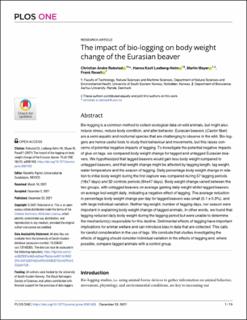| dc.contributor.author | Robstad, Christian Andre | |
| dc.contributor.author | Lodberg-Holm, Hanna Kavli | |
| dc.contributor.author | Mayer, Martin | |
| dc.contributor.author | Rosell, Frank Narve | |
| dc.date.accessioned | 2022-04-28T07:51:06Z | |
| dc.date.available | 2022-04-28T07:51:06Z | |
| dc.date.created | 2022-01-25T10:30:26Z | |
| dc.date.issued | 2021 | |
| dc.identifier.citation | Robstad, C. A., Lodberg-Holm, H. K., Mayer, M. & Rosell, F. (2021). The impact of bio-logging on body weight change of the Eurasian beaver. PLoS One, 16(12), Artikkel e0261453. | en_US |
| dc.identifier.issn | 1932-6203 | |
| dc.identifier.uri | https://hdl.handle.net/11250/2993112 | |
| dc.description.abstract | Bio-logging is a common method to collect ecological data on wild animals, but might also induce stress, reduce body condition, and alter behavior. Eurasian beavers (Castor fiber) are a semi-aquatic and nocturnal species that are challenging to observe in the wild. Bio-loggers are hence useful tools to study their behaviour and movements, but this raises concerns of potential negative impacts of tagging. To investigate the potential negative impacts of glue-on tags, we compared body weight change for tagged and untagged Eurasian beavers. We hypothesized that tagged beavers would gain less body weight compared to untagged beavers, and that weight change might be affected by tagging length, tag weight, water temperature and the season of tagging. Daily percentage body weight change in relation to initial body weight during the first capture was compared during 57 tagging periods (18±7 days) and 32 controls periods (64±47 days). Body weight change varied between the two groups, with untagged beavers on average gaining daily weight whilst tagged beavers on average lost weight daily, indicating a negative effect of tagging. The average reduction in percentage body weight change per day for tagged beavers was small (0.1 ± 0.3%), and with large individual variation. Neither tag weight, number of tagging days, nor season were important in explaining body weight change of tagged animals. In other words, we found that tagging reduced daily body weight during the tagging period but were unable to determine the mechanism(s) responsible for this decline. Detrimental effects of tagging have important implications for animal welfare and can introduce bias in data that are collected. This calls for careful consideration in the use of tags. We conclude that studies investigating the effects of tagging should consider individual variation in the effects of tagging and, where possible, compare tagged animals with a control group. | en_US |
| dc.language.iso | eng | en_US |
| dc.rights | Navngivelse 4.0 Internasjonal | * |
| dc.rights.uri | http://creativecommons.org/licenses/by/4.0/deed.no | * |
| dc.title | The impact of bio-logging on body weight change of the Eurasian beaver | en_US |
| dc.title.alternative | The impact of bio-logging on body weight change of the Eurasian beaver | en_US |
| dc.type | Peer reviewed | en_US |
| dc.type | Journal article | en_US |
| dc.description.version | publishedVersion | en_US |
| dc.rights.holder | © 2021 Robstad et al. | en_US |
| dc.source.volume | 16 | en_US |
| dc.source.journal | PLOS ONE | en_US |
| dc.source.issue | 12 | en_US |
| dc.identifier.doi | https://doi.org/10.1371/journal.pone.0261453 | |
| dc.identifier.cristin | 1989223 | |
| dc.source.articlenumber | e0261453 | en_US |
| cristin.ispublished | true | |
| cristin.fulltext | original | |
| cristin.qualitycode | 1 | |

